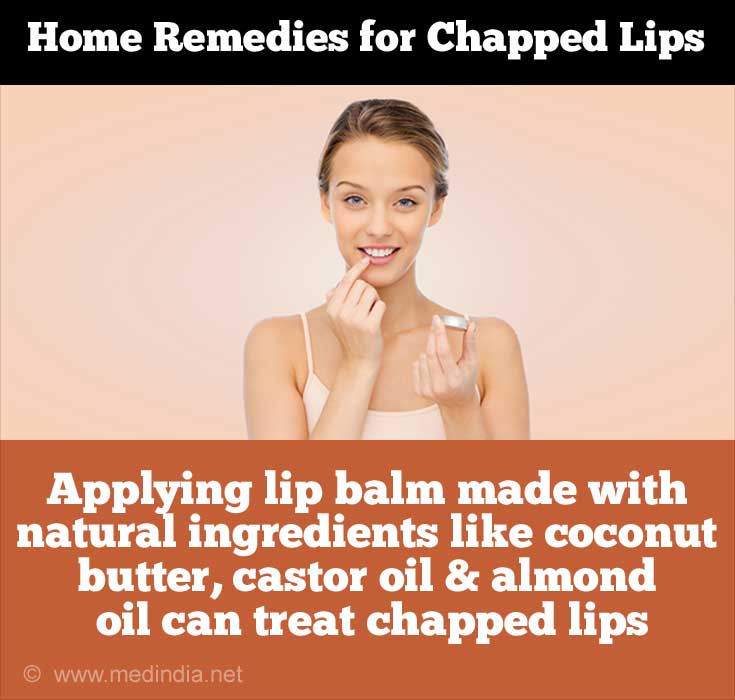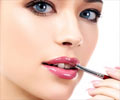What are Chapped Lips?
Chapped or dry lips characterized by dryness, redness, cracking, flaking, and tender or sore lips are common during winters. Since lips have a thin layer of skin, they are more prone to becoming chapped.
Generally, sun exposure, dehydration or licking lips cause dry lips. Topical application of lip balms or increasing fluid intake restores supple lips quickly.
Chapped lips due to climatic changes do not indicate any grave health complication. However, prolonged dry lips may signal a serious health problem.
Some people develop a more severe form of chapped lips called cheilitis. It is characterized by cracked skin at the corner of the lips caused by infection or inflammatory diseases.
What Causes Chapped Lips?
Lips do not contain oil glands, making them susceptible to drying out and becoming cracked. Lack of moisture both weather-related or lack of topical emollients can intensify the problem. Breathing from the mouth makes lips dry as the air dries lip moisture.
Weather changes, allergies to cosmetic products, infections, medications, dehydration,
Weather-induced changes:
Chapped lips are rampant during winters but some people develop dry lips even in summer.
Lips don't contain the pigment melanin, which protects against UV rays. Dehydration coupled with frequent sun exposure in summer can worsen the problem. Also, we are less likely to use petroleum jelly during summers since we sweat a lot.
Long hot water showers, indoor heating, lack of humidity combined with the tendency to drink less water causes chapped lips during winters. When the air outside is cold and dry, the skin loses its moisture and gets cracked.
Dehydration:
Excess sweating in summers or reduced water intake in winters may cause dehydration. If you’re not drinking enough, the skin gets dehydrated and lips become dry.

Licking lips
Whenever your lips feel dry, you tend to lick them. But after licking them, they feel dry again, so you lick them again which turns into a continuing cycle of lip-dehydration, because saliva strips the lips of moisture, causing more dryness.
Nutritional deficiencies:
Nutritional deficiencies, particularly deficiency in vitamin A, E, B-complex vitamins and zinc and essential fatty acids contribute towards chapped lips.
Vitamin A, omega-3 fatty acids and riboflavin (vitamin B-2) help in skin repair and maintenance of healthy hair, nails and skin, including lips. Deficiency of these vitamins may result in chapped lips.
The National Resource Center on Nutrition, Physical Activity and Aging lists cracked lips as an indicator of zinc deficiency.
Pyridoxine (vitamin B-6) deficiency is related to skin disorders, dermatitis and cracks at the corners of the mouth.
Aging increases dryness of lips and hence deficiency of anti-oxidant vitamins like vitamin C and E may cause chapped lips.
Allergens:
Toothpaste containing sodium lauryl sulphate (SLS) and guaiazulene and lipsticks containing propyl gallate or phenyl salicylate act as allergens causing chapped lips.
Prolonged intake of vitamin B12 supplements may develop an allergy to cobalt, which contributes towards dry lips.
Food allergies or contact with allergens such as fragrances or dyes, in cosmetics or skincare products, may cause chapped lips.

Medications:
Certain medications like lithium for treating depression, chemotherapy drugs, Accutane for acne or wrinkles, propranolol for blood pressure or prochlorperazine for vertigo may result in chapped lips.
Home Remedies for Chapped Lips
While lip balms and petroleum jelly work wonders for chapped lips, the following home remedies are more effective, safer and cheaper in treating dry lips:
Papaya:
Papaya acts as a natural exfoliant. Apply mashed, ripe papaya to the lips and rinse off after 10 minutes.
Cucumber:
Gently rub a small slice of cucumber across your dry lips and leave it for 15- 20 minutes and then wash lips with water. This process can be repeated multiple times in a day. Cucumber soothes dry lips and relieves tenderness.

Oil/gel:
Topical application of aloe vera gel, olive oil, mustard oil or coconut oil multiple times in a day function as natural moisturizers which heal chapped lips due to weather-induced.
Rose petals:
Soak rose petals in raw milk for 4-5 hours and churn the mixture into a thick paste. Apply this paste 2-3 times in a day, particularly before going to bed at night.

Sugar and honey exfoliation:
Exfoliating dead cells off chapped lips restore their natural softness quicker. Honey is a great moisturizer possessing healing properties for treating chapped lips.
Mix 2 teaspoons of sugar with 1 teaspoon of honey. Apply the paste to your lips and keep it for a few minutes. Gently rub the mixture on your lips to loosen the dead skin cells. Wash it off with lukewarm water.
Tips:
- Before applying any lip ointment, exfoliate dead skin off your lips
- To avoid dry lips, always apply sunscreen on your lips before stepping out.
- While buying lip balms, opt for vitamin E or glycerin-based lip-balms or ointments with a sun protection factor 15 (SPF) which contains natural ingredients such as coconut butter, beeswax, shea butter, castor oil, lanolin and almond oil.

Dietary tips which help to relieve chapped lips include:
- Ensure an adequate intake of water and other fluids on a daily basis to prevent dehydration.
- Eat vitamin A rich foods like yellow, red and orange vegetables and fruits and vitamin-E rich foods like nuts, cereals, leafy vegetables prevent chapped lips.
- Incorporate vitamin C- rich foods like citrus fruits in your daily diet as it increases collagen production, which keeps lips supple.
- Foods like nuts, oilseeds, chicken and eggs meet zinc requirement whereas flaxseeds, walnuts, salmon are sources of omega-3 fats and must be eaten on a daily basis.







